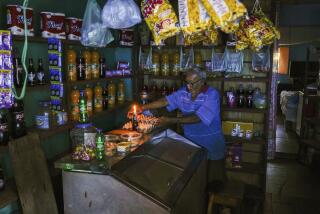5 Bolivian states strike for autonomy
- Share via
SUCRE, BOLIVIA — Leaders in five opposition-controlled states proclaimed a general strike Tuesday, paralyzing a broad swath of this deeply divided Andean nation.
Clashes broke out in the eastern city of Santa Cruz, epicenter of the opposition, where anti-government protesters fought with loyalists of leftist President Evo Morales. Police fired tear gas to disperse rival groups, which exchanged fusillades of sticks and stones.
Pro-strike activists blocked roads, and schools, shops, airports and private vehicular traffic were largely shut down in five of Bolivia’s nine states, including Santa Cruz. The states are seeking greater autonomy and a bigger share of royalties from the extraction of gas and petroleum, which are drilled mostly in regions controlled by the opposition.
The strike marks an escalation of the political crisis that has divided the country into two camps: for and against Morales, Bolivia’s first indigenous president.
Morales has nationalized energy, mining and telecommunications firms and is a strong ally of Venezuelan President Hugo Chavez. The Bolivian leader has accused U.S. officials of conspiring with right-wing elements to oust him, a charge denied by Washington.
Conservative foes accuse Morales of taking the country down the path of a communist-style dictatorship.
The strike comes less than two weeks after Morales won a resounding victory in a national recall referendum, garnering more than 67% of all votes. Four Western states with large highland indigenous populations provided much of his majority.
However, opposition governors in four autonomy-minded lowland states who also faced recalls emerged victorious as well in the Aug. 10 vote. Morales’ indigenous allies are less prominent in the lowlands region, which has an ethnically diverse population. The clashing referendum results underscored the nation’s political stalemate.
There was talk of reconciliation between the two sides after the recall balloting. But initial negotiations collapsed, and opposition leaders decided to call the strike.
The central government in La Paz labeled the strike an illegal act aimed at provoking bloodshed and deepening political divides in Bolivia. Morales calls the autonomy movement an effort to break away from Bolivia, a charge denied by advocates.
“The civic strike brings severe threats of violence,” Juan Ramon Quintana, chief minister to the president, told reporters.
But strike leaders said the Morales administration, not the rebellious states, was fomenting violence.
“If there are provocations, they will come from the government . . . not from the civilian population,” said farmer Branko Marinkovic, a strike leader in Santa Cruz. “The acts of violence are committed by instigators against democracy.”
Pro-strike youths were reported to be patrolling the streets of Santa Cruz with baseball bats and sticks to ensure that no one violated the shutdown.
Meanwhile, supporters of the president stood guard outside Plan 3,000, a poor neighborhood that includes many pro-Morales migrants from the western highlands.
Strike organizers called Tuesday’s shutdown a democratic manifestation of their desire for regional autonomy from the central government in La Paz. Four of the striking states -- Santa Cruz, Beni, Pando and Tarija -- have demanded greater autonomy in regional votes that Morales has called illegal. The fifth pro-strike state, Chuquisaca, with its capital here in Sucre, is contemplating a similar vote.
Allies of Morales say the strike and the autonomy movement are a ploy by wealthy, conservative landowners and allies keen to topple the government and win back benefits for Bolivia’s conservative elite.
“Instead of calling for a strike,” said Carlos Condori, a pro-Morales activist in Santa Cruz, “these businessmen should pay their workers better for the exploitation they suffer.”
--
patrick.mcdonnell @latimes.com
--
Special correspondent Martin Monasterio in Santa Cruz contributed to this report.
More to Read
Sign up for Essential California
The most important California stories and recommendations in your inbox every morning.
You may occasionally receive promotional content from the Los Angeles Times.













